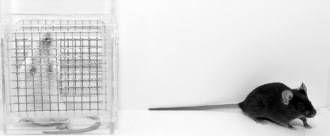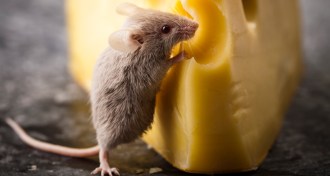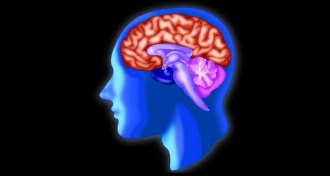Neuroscience
-
 Neuroscience
NeuroscienceDogs’ brains may process speech similar to humans’
When it comes to interpreting human speech, dogs may have brain-hemisphere biases similar to people’s.
-
 Neuroscience
NeuroscienceThe molecular path of best resilience
Many studies focus on susceptibility to stress and how it triggers depression. But a new study highlights a protein important in resilience, showing that resisting stress takes work, too.
-
 Health & Medicine
Health & MedicineAdd high-fat diet to the ‘don’t’ list for pregnant moms
There’s always controversy over what to eat while pregnant. Four animal studies at this year’s Society for Neuroscience meeting bring together negative effects of high-fat diets.
-
 Neuroscience
NeuroscienceAfter injury, estrogen may shield the brain
Estrogen helps to prevent some of the chronic inflammation that occurs after brain injury.
-
 Neuroscience
NeuroscienceBreathing returns to paralyzed rats
Scar tissue–busting enzyme plus rehabilitation therapy improves respiration long after rats’ initial spinal cord injuries.
By Meghan Rosen -
 Neuroscience
NeuroscienceAreas people like to be caressed match up with nerve fibers
A caress in a sweet spot at the right speed activates nerve fibers tied to social touch.
-
 Neuroscience
NeuroscienceProtein production prevents sleep-loss forgetfulness
Boosting levels of certain proteins in mice prevented memory problems associated with sleep deprivation.
-
 Neuroscience
NeuroscienceMold may mean bad news for the brain
Living with mold isn’t good for your lungs. A study in mice shows that mold exposure may also cause inflammation that is bad for the brain.
-
 Neuroscience
Neuroscience‘Bath salts’ reduce communication in rat brains
The recreational drugs known as bath salts cause a loss of communication between areas in the rat brain.
-
 Neuroscience
NeuroscienceMagnets in helmets might make football safer
The repulsive force of magnets in football helmets could slow the impact of collisions, reducing concussion danger and making the game safer.
-
 Neuroscience
NeuroscienceStopped brain clock saves memory in hamsters
Broken timekeeper in brain may explain some memory problems, hamster study suggests.
By Meghan Rosen -
 Health & Medicine
Health & MedicineFoul smells during sleep may help smokers quit
A night of smelling rotten eggs and fish while inhaling cigarette odors makes smokers reach for fewer cigarettes upon waking.